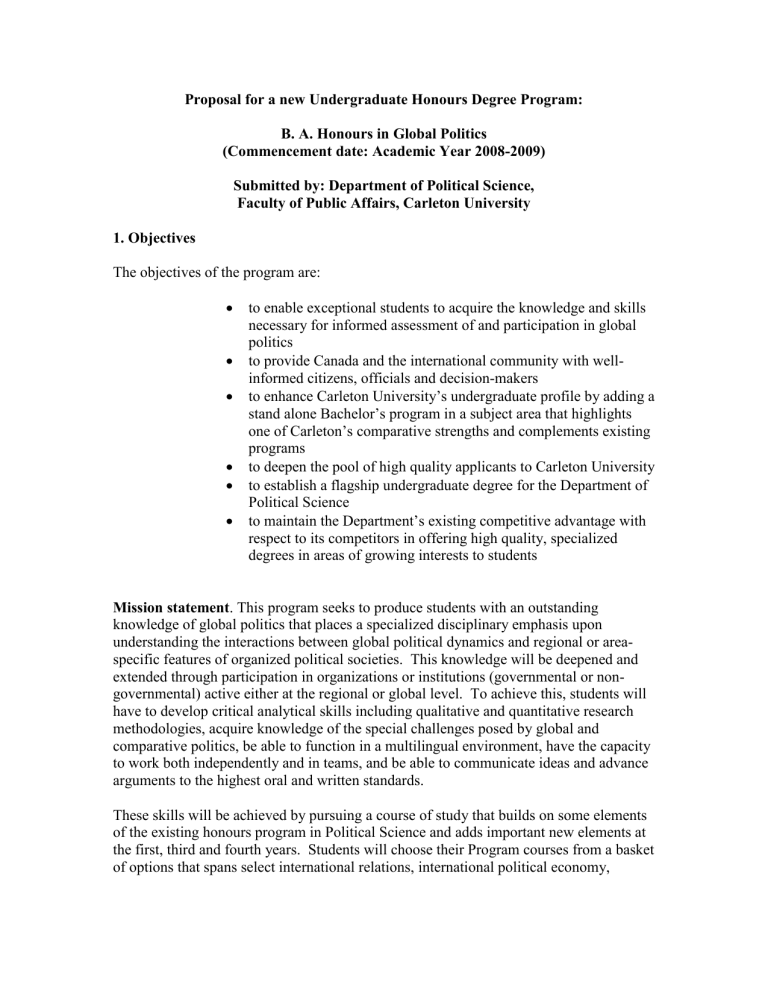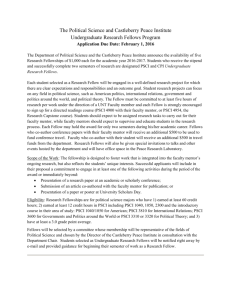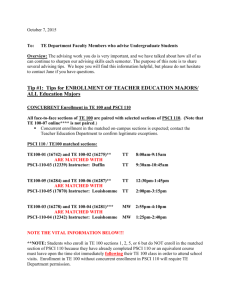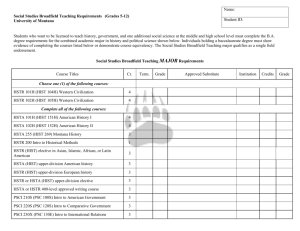- Carleton University

Proposal for a new Undergraduate Honours Degree Program:
B. A. Honours in Global Politics
(Commencement date: Academic Year 2008-2009)
Submitted by: Department of Political Science,
Faculty of Public Affairs, Carleton University
1. Objectives
The objectives of the program are:
to enable exceptional students to acquire the knowledge and skills necessary for informed assessment of and participation in global politics
to provide Canada and the international community with wellinformed citizens, officials and decision-makers
to enhance Carleton University’s undergraduate profile by adding a stand alone Bachelor’s program in a subject area that highlights one of Carleton’s comparative strengths and complements existing programs
to deepen the pool of high quality applicants to Carleton University
to establish a flagship undergraduate degree for the Department of
Political Science
to maintain the Department’s existing competitive advantage with respect to its competitors in offering high quality, specialized degrees in areas of growing interests to students
Mission statement . This program seeks to produce students with an outstanding knowledge of global politics that places a specialized disciplinary emphasis upon understanding the interactions between global political dynamics and regional or areaspecific features of organized political societies. This knowledge will be deepened and extended through participation in organizations or institutions (governmental or nongovernmental) active either at the regional or global level. To achieve this, students will have to develop critical analytical skills including qualitative and quantitative research methodologies, acquire knowledge of the special challenges posed by global and comparative politics, be able to function in a multilingual environment, have the capacity to work both independently and in teams, and be able to communicate ideas and advance arguments to the highest oral and written standards.
These skills will be achieved by pursuing a course of study that builds on some elements of the existing honours program in Political Science and adds important new elements at the first, third and fourth years. Students will choose their Program courses from a basket of options that spans select international relations, international political economy,
2 security, international institutions and human rights courses, comparative politics and area studies.
Consistency of the program . There is a strong case to be made for Departments to play to their strengths in attracting high quality candidates for a flagship program, which reflects well both on the Department but also on the entire University. By combining two of the strongest elements of this Department’s areas of expertise – international relations and comparative politics – this program offers to suitable students a uniquely focused subject while also sharpening the varied skills which any graduate needs further their career and make an solid contribution to the world after completion of their undergraduate studies.
In devising this degree, we have steered clear of overlapping with other programs whose strengths and attractions lie either in the emphasis on policy or on inter-disciplinary study
(or both). This degree anchors its prime attraction for students solidly in the Department of Political Science, and in the areas of international relations and comparative politics that the vast majority of students declare anyway for their degree (when they do declare).
It therefore builds on the strengths of Political Science, and by carving out a flagship program should deepen and extend the applicant pool at the high end for Carleton as a whole.
This program seems to fit most closely with the B.A. Honours Specialization degree as it appears in Template for the New B.A. Degrees . However, it differs from the template in that the total number of credits in the Major range from a minumum 10.5 (9.5 for
Combined Honours) to a maximum of 15, while the corresponding figures in the template are 12 and 15, with no Combined Honours).
2. Program Description
B.A. Honours, Global Politics (20 credits)
2.1 By year:
First year (5 credits):
new courseGPOL1000: small group seminar (modelled on existing
PSCI 2601 (International Relations: Global Politics) / 2602
(International Relations: Global Political Economy) – no further credit for 2601/2602): 1 credit
language skill (open to any language; see lang. req.): 1 - 2 credits
B.A.Honours Breadth Requirement course: 1 credit
other courses (including other Political Science courses): 1- 2 credits (number depends on language credits taken). Students may take one or more of: PSCI 2101 and PSCI 2102, with departmental permission.
3
Second year (5 credits):
PSCI 2101 (Comparative Politics of Industrialized States)
/2102 (Comparative Politics of Development and
Underdevelopment): 1 credit
PSCI 2701 (Introduction to Research Methods in Political Science)
/2702 (Quantitative Research Methods in Political Science): 1 credit
language skill (unless lang. requirement fulfilled) and/or PSCI
2300 (History of Political Thought): 0 – 2 credits
other courses (including those from the GP list, other Political
Science courses, and non-Political Science courses): 1 – 3 credits
(number depends on language credits taken)
Third year (5 credits):
new course GPOL 3000 (Seminar on ‘Themes in Global and
Comparative Politics’): 0.5 credit
one semester internship in institution or organization active in global or regional politics (equivalent of 2.5 credits). This internship is not required but strongly recommended.
other courses (including those from GP list, other Political Science courses, and non-Political Science courses): 2 credits
Fourth year (5 credits):
GPOL 4908 (honours thesis + prep-seminar): 1 credit (thesis + seminar participation), and one additional 4 th
year seminar credit from GP list; or two 4 th
year seminar credits from GP list: 2 credits
other courses (including those from GP list, other Political Science courses, and non-Political Science courses): 3 credits
2.2
Calendar Language
B. A. Honours Global Politics (B.A. Hons. G.P.)
Department of Political Science
Faculty of Public Affairs
The Department offers this degree program to enable exceptional students to acquire the knowledge and skills necessary for informed assessment of and participation in global politics.
Academic Performance Evaluation and Graduation Requirements
Students in B.A.Hons.G.P. must satisfy the University regulations (see the Academic
Regulations of the University section of this Calendar.) for B.A.Honours programs, as well as those requirements listed below under ‘Program Requirements’.
4
Program Language Requirement
Prior to graduation, students must satisfy a language proficiency requirement in one of the following ways:
1.
Successful completion of two languages other than English at the 2xxx level in languages offered at Carleton; or
2.
Successful completion of one language other than English at the 3xxx level in a language offered at Carleton; or
3.
Successful completion of one language other than English at the 2xxx level in a language offered at Carleton, and PSCI 2300.
If Russian is chosen by the student, RUSS 2200 will be treated as the equivalent of a credit at the 3xxx level. If French is chosen, FREN 1100 will be treated as the equivalent of a credit at the 2xxx level in another language, and FREN 2xxx as the equivalent of a credit at the 3xxx level. Proficiency in French may be demonstrated by French language examinations conducted by the Department, or by successful completion of French
Immersion in high school or possession of a Bilingual Diploma or Certificate. For other languages, the onus is on the student to provide suitable documentary evidence of proficiency to the Department. Students should note that they will be required to use one or more of their elective credits if they choose to satisfy the language requirement through approved language credits.
Courses in Global Politics
PSCI 2101 , PSCI 2102 , PSCI 2300, PSCI 2500 , PSCI 3100 , PSCI 3101 ,
PSCI 3102 , PSCI 3103 , PSCI 3105 , PSCI 3107 , PSCI 3108 , PSCI 3200 ,
PSCI 3201 , PSCI 3203 , PSCI 3204 , PSCI 3205 , PSCI 3206 , PSCI 3207 ,
PSCI 3208 , PSCI 3209 , PSCI 3302 , PSCI 3307 , PSCI 3404 , PSCI 3405 ,
PSCI 3407, PSCI 3409 , PSCI 3500 , PSCI 3502 , PSCI 3600 , PSCI 3601 ,
PSCI 3603 , PSCI 3605 , PSCI 3606 , PSCI 3607 , PSCI 3700 , PSCI 3701 ,
PSCI 3702 , PSCI 3703 , PSCI 3704 , PSCI 3705 , PSCI 3801 , PSCI 3802 ,
PSCI 3805 , PSCI 4005 , PSCI 4008 , PSCI 4103 , PSCI 4104 , PSCI 4105 ,
PSCI 4200 , PSCI 4201 , PSCI 4203 , PSCI 4204, PSCI 4206 , PSCI 4207 ,
PSCI 4208 , PSCI 4303 , PSCI 4305 , PSCI 4306 , PSCI 4307 , PSCI 4400 ,
PSCI 4402 , PSCI 4407, PSCI 4409 , PSCI 4500 , PSCI 4501 , PSCI 4502,
PSCI 4503, PSCI 4505 , PSCI 4601 , PSCI 4602 , PSCI 4603 , PSCI 4604 ,
PSCI 4605 , PSCI 4606 , PSCI 4607 , PSCI 4608 , PSCI 4609 , PSCI 4700,
PSCI 4800 , PSCI 4801 , PSCI 4802 , PSCI 4803 , PSCI 4804 , PSCI 4805 ,
PSCI 4806 , PSCI 4807 , GPOL 1000 (the 1 st year seminar),
GPOL 3000 (the 3 rd
year seminar), GPOL 4908 (honours essay course for the program students). In addition to the courses offered by the Department of
Political Science, the Institute for European Studies offers numerous areas studies courses that are included in the GPOL list:
EURR 4002 - Post-Soviet States and Societies
EURR 4003 - Social and Political Perspectives in Europe
5
EURR 4005 - Environmental Problems and Politics in East/Central Europe and Eurasia
EURR 4006 - European Integration and the Business Environment in East/Central Europe
EURR 4007 - Social and Political Discourse in Russia
EURR 4008 - Nationalism and Ethnic Conflict in Eastern and Central Europe
EURR 4100 - Nation-Building in Central and Eastern Europe
EURR 4101 - The Balkans
EURR 4104 - European Integration and European Security
EURR 4106 - Selected Topics in European Integration Studies
EURR 4107 - Russia and the New World Order, 1992 to the Present
EURR 4201 - Special Topics in European Studies
EURR 4202 - Special Topics in Russian and Eurasian Studies
EURR 4203 - Imperial and Soviet Russia
EURR 4204 - Central Europe, Past and Present
Program Requirements
B.A. Honours Global Politics (20.0 credits)
A. Credits Included in the Major CGPA
(10.5 credits):/
1. 1.0 credit in GPOL1000;
2. 2.0 credits in PSCI 2101, 2102, 2701, 2702;
3 . 0.5 credit in GPOL 3000;
4 . 2.5 credits in the internship [GPOL 3100], or 2.5 credits from the GP list if the internship is not taken;
5.
2.0 credits at the 4000-level which may be satisfied by either: a.
2.0 credits in 4000-level PSCI seminars from the GP list, or b.
GPOL 4908 [1.0] and 1.0 credit from 4000-level PSCI seminars from the GP list ;
6. 2.5 credits from the GP list other than those listed in items 1-5.
B. Credits Not Included in the Major CGPA
(9.5 credits).
7. 5.0 credits in electives not in GPOL, FYSM courses taught by Pol.Science, and PSCI;
8. 4.5 credits in free electives.
C. Additional Requirements:
9. Global Politics language requirement must be met.
B.A. Combined Honours, Global Politics (20.0 credits)
Combined Honours programs in Global Politics program may be taken by students in which Global Politics is combined with any other department or academic unit at
Carleton that allows for it. Combined Honours with Political Science, however, is not allowed. Details of the specific requirements for those programs may be obtained from the Department concerned. The Global Politics requirements for Combined Honours are
6 as listed below. Details of the specific requirements for the other discipline may be obtained from the Department concerned.
A. Credits Included in the Global Politics Major CGPA
(9.5 credits):
1. 1.0 credit in GPOL 1000;
2. 2.0 credits in PSCI 2101, 2102, 2701, 2702;
3.
0.5 credit in GPOL 3000;
4 . 2.5 credits in the internship [GPOL 3100], or 2.5 credits from the GP list if the internship is not taken;
5 . 2.0 credits at the 4000-level which may be satisfied by either: a.
credits in 4000-level PSCI seminars from the GP list, or b.
GPOL 4908 [1.0] and 1.0 credit at 4000-level PSCI seminars from the GP list;
6. 1.5 credits from the GP list other than those listed in items 1-5.
B. Credits Included in the other department’s Major CGPA
7. The requirements as stated for Combined Honours in the other discipline must be met.
C. Additional Requirements:
8 . Sufficient free elective credits to make a total of 20.0 credits for the program.
9 . Global Politics language requirement must be met.
B.A. Hons. Global Politics with a Minor in another discipline .
Sudents may declare a minor in another discipline (other than Political Science). To graduate with a B.A. Hons. G.P.with a minor in another discipline, the student must satisfy the requirements of the other discipline as well as complete all requirements of the
B.A. Hons. G.P.
2.3. New Course Proposals
GPOL 1000 [1.0 credit]
GLOBAL POLITICS
Theories, concepts and issues in global politics and global political economy. Topics: conflict and intervention, peace and security, international institutions, human rights, gender, culture, globalization, multinational corporations, foreign policy, environmental issues, international development and relations between rich and poor countries.
Precludes additional credit for PSCI 2601 and PSCI 2602.
Normally restricted to students entering the first year of the B.A.Hons.G.P. program.
Seminar three hours a week.
Rationale: This seminar is the entry level course for all students in the B.A.Hons.G.P. It combines the subject matter of PSCI 2601 and PSCI 2602, courses that are normally taken at the 2 nd year level. More information about this course is noted in the 2.5
7
Summary of Program Features .
GPOL 3000 [0.5 credit]
THEMES IN GLOBAL AND COMPARATIVE POLITICS
The seminar focuses on a broad theme or issue that includes a global and comparative focus. Student research papers will be on a topic that relates to their particular interest.
Possible themes or topics include environmental degradation; nuclear proliferation; and the impact of 9/11.
Normally restricted to students entering the third year of the B.A.Hons.G.P. program.
Seminar three hours a week.
Rationale: Students would gain in-depth knowledge of the global and regional/ comparative dynamics of interest to a tenured faculty member with special teaching and research interests in the theme of the course. This course provides an opportunity for students in the B.A. Hons. G.P. program to have another common course. More information about this course is noted in the 2.5 Summary of Program Features.
GPOL 3100 [2.5 credits]
INTERNSHIP IN GLOBAL POLITICS
The internship provides students with the opportunity to work with and study an organization whose institutional focus is on some international or regional aspect.
Students will write a research paper on a topic related either to the organization or to the focus of the organization. These papers will be graded by a faculty member related to the
B.A. Hons.G.P. program.
Normally restricted to students entering the 2 nd
half of the third year of the program.
Rationale: The internship will provide students with a hands-on experience with some aspect of global politics. The requirement for a research paper will give students the opportunity to integrate their internship experience with their academic studies. More information about this course is noted in the 2.5 Summary of Program Features.
GPOL 4908 [1.0 credit]
HONOURS GRADUATION ESSAY
The Honours essay is supervised under the direction of a faculty member who is either selected by the candidate or assigned early in the year. The Honours essay is evaluated by both the supervisor and an appointed reader. Students intending to proceed to postgraduate studies are strongly encouraged to complete an Honours essay.
Prerequisite: fourth-year Honours standing in Global Politics with a Global Politics
Science CGPA of 9.00 or better, or permission of the Director of the Program.
Rationale: The Honours Essay is an opportunity for students to write a long paper on a subject related to their interest in Global Politics. More information about this course is noted in the 2.5 Summary of Program Features.
8
2.4 Program Language Requirement
See Program Language Requirement under item 2.2.
2.5 Summary of Program Features
The new elements are the first year seminar, a new course put on in the first semester of the third year on ‘Themes in Global and Comparative Politics’, the internship in the second semester of the third year, and the honours seminar in the fourth year. Each of these new elements will be open only to participation by students in the program, and will help to develop the esprit de corps that will be one of the hallmarks of this flagship program.
The first year seminar will bring these students together for the first time, and introduce them to the theories, concepts and issues in global politics. Topics will include conflict and intervention, peace and security, international institutions, norms and ethics, human rights, gender, culture, and globalization. The second term is an introduction to the global political economy. Topics will include contemporary changes in the global political economy, multinational corporations, foreign economic policy, global and regional economic institutions, environmental issues, international development and relations between rich and poor countries. The first year seminar will contain the content of the existing second year lecture courses, PSCI 2601 (International Relations: Global Politics) and PSCI 2602 (International Relations: Global Political Economy).
The pedagogy of the seminar will parallel that of the university’s first year seminar program: 1. The seminar will be interactive, and will provide frequent and early evaluation . 2. The instructor will provide extensive consultation, advising and mentoring. 3. The seminar will focus on close analysis of texts. 4. The seminar will help students learn to work in groups/as teams in and out of class, and to benefit from peer interaction in a ‘social and intellectual home'.
5. The seminar will help students integrate their learning via a culminating project/essay with careful guidance through the phases of development.
The third year seminar on ‘Themes in Global and Comparative Politics’ will focus on a broad theme or issue that includes a global and comparative focus. Students would gain in-depth knowledge of the global and regional/comparative dynamics of interest to a tenured faculty member with special teaching and research interests in the theme of the course. In the seminar students would write a research paper related to the theme of the course, on a topic that relates to their particular interest, whether it is security, gender, global political economy, etc. This paper could focus on a global or comparative perspective, or combine the two.
Also in the third year is the internship program, a key part of the new B.A. Hons.G.P.
The semester-long internship program for students is scheduled for the second half of students’ third year. The internship will be a key attraction to students on this program, and ideally it should be offered among a select number of international or regional, governmental or non-governmental organizations. These may include organizations such as the World Bank (political economy), NATO or OSCE (security), UNDP
9
(development), WHO (health), UNHCR (human rights), IAEA (nuclear proliferation), a suitable regional organization such as the OAS, or a select non-governmental organization in Canada or abroad that deals with a topic, issue or problem that is international, regional or comparative in nature. Internship in a Canadian government department with an international decision-making mandate is also a possibility (e.g.
DFAIT, CIDA, etc). The internship will be unpaid.
The goal of the internship is for students to obtain real world experience working on substantive issues. All participating organizations will sign an agreement indicating their responsibilities. The organizations will agree that interns will participate in an active manner on substantive issues relating to the organization, and not be relegated to clerical work. Students will have to submit a substantial independent report on one aspect of their internship in order to receive credit for this part of the program. This report will be given a letter grade by a committee of the teaching faculty in the program. Participating organizations will recognize that some of the intern’s duties (constituting approximately
25% of work time) will be allocated to preparing this report. Finally, completion of this portion of the program will also require a satisfactory report from the participating institution.
The internship is not required to successfully complete the degree program in Global
Politics. To be eligible for the 3 rd
year internship, students in the program must attain at least an 8.0 pt. average in their major courses by the end of their second year (i.e. after 8-
10 credits). In place of the internship, ineligible students would take 2.5 credits in other courses in the Global Politics list. Other students, who meet the minimum standards for participating in the internship program, may opt out of participation upon request. They also would take 2.5 credits in other courses in the Global Politics list.
The fourth year honours seminar will be the seminar in which students in the program complete their honours essay. A dedicated full-time faculty member whose research embraces global and or comparative politics will teach it, and the seminar will provide a forum in which the knowledge and skills gained thus far in the program will be channelled into a major piece of independent research on a topic chosen in consultation with their supervisor and course director. The grade for the course will be mainly the grade awarded to the honours essay. The honours essay is optional, and students may take in its place a different 4 th
year honours seminar. To qualify for the honours essay, students must have at least a B+ average in GP courses, or obtain permission from the
Department.
3. Academic Merit and Program Delivery
3.1 Admission Requirements . The Ontario Secondary School Diploma (OSSD) or equivalent including a minimum of six Grade 12 U or M courses. Equivalent courses may be substituted between the OAC and new curriculum courses. Entrance to the program will be limited to students with grades in high school at a minimum of 80, although the intent of the program is attract a cohort of students whose average approaches 90.
Enrolment will be limited to between 25 students in the first couple of years, rising
10 possibly to 50 or more once the program is suitably established. Resources, obviously, will limit growth in admissions but also the constraints of the proposed semester-long mandatory internship program in the 3 rd year.
If space is available, students may apply to transfer into the program after the first and possibly second year provided they would be able to complete all the requirements by the end of their fourth year (PSCI 2601 and 2602 could be substituted for GPOL 1000). Late admission to the program will be at the discretion of the Department.
In order to meet the objectives of the program, the structure and curriculum of the program introduces second year material to students in the first year in order to develop students at an early stage, as well as to open up space in the second year to take courses normally taken in the third year. The new elements in the third and four years – the new seminar, the internship and the honours essay seminar – are designed to provide a special learning environment in the upper years of the program. To facilitate reaching program objectives the mode of delivery will involve a more intense use of seminars, at the first and third year levels, and the semester-long internship, in addition to normal lecture courses in the second and third years. The more intense use of seminar courses and the evaluation of the major paper that students write as part of their internship will facilitate the evaluation of students’ progress through the program.
3.2 Availability of faculty . The Department of Political Science ranks near the top of political science departments across the country. At present 32 faculty members of the department are in either or both of the department’s field groups of international relations and comparative politics (see Appendix D. for list of these faculty). These professors teach the approximately 85 courses in international relations and comparative politics that the department offers on a rotating basis. Professors teach in those areas in which they have teaching and research interest and competence. The need for additional faculty is addressed in 6.1 Human and Material Resources .
4. Demand and Impact
4.1 Student Demand. The extent of student demand for this program can be demonstrated in several ways. Already, the brunt of the department’s existing program focuses on international relations and comparative politics: about two-thirds of existing courses in the department are classified as either international relations or comparative politics. At the fourth year level, where students can opt for a concentration in any one of seven areas, about eighty percent opt for concentrations in either international relations or comparative politics. Available data on course and program enrolments, past, current and projected in the area can be found in Appendix B.
5. Consultation
See Appendix C (Consultation).
6. Resource Requirements and Availability
11
6.1 Human and Material Resources
Academic and non-academic staffing. Most of the courses in the program will be taught by existing members of the department (see Section 3.2.) However, new resources will be needed to mount this program. There are 2.5 new course equivalents in the program, plus compensation is needed for supervising the program, evaluating the major papers from the semester-long internships and advising students within the program. The setting up of the internship program – locating and working with the appropriate organizations and then matching them to students -- will be very labour intensive. To implement the new program, one new faculty member would be needed.
Space allocation. Offices will be needed for the new professor and the new administrator.
Classrooms. Almost all of the courses currently exist. Three additional seminar courses will be added, for which classroom space will be needed.
Administrative support. For the administration of the program, one new administrative position would be needed. This person would be responsible, in addition to the general administration requirements of the program, to carry out the time-consuming tasks associated with the running of the internship program.
Equipment and supplies. Photocopying, stationery, office supplies: $1000
Implications for instructional support depts (CCS; Instructional Media Services, etc.) There are no financial implications for other support services at Carleton.
6.2 Library Statement.
See Appendix C (Consultation).
6.3
Statement Comparing Available Required Resources with Additional Required
Resources
Most of the resources to offer the program are already available with the 34 members of the department from the International Relations and Comparative Politics groups. The statement of addition required resources is presented in 7.3 Costs.
7 FINANCIAL IMPLICATIONS
7.1 Income Implications:
12
The B.A.Hons. G.P. will attract new students to Carleton, bringing additional revenue to the university (in the form of tuition). While some of these students may have chosen
Carleton anyway, the attractiveness of the program will garner additional highlymotivated students who may well have decided upon other universities. We anticipate, moreover, that the prestige of the program will throw additional light on the department, attracting students who would not qualify for the program but would for the Honours degree in Political Science. Because the pool of these students exceeds that of the pool from which the program will draw, we anticipate the enrolment effects of the new program will be even greater for the general honours program in the Department and in
University as the whole (as a number of these students will end up in departments other than Political Science).
Part of the attraction of the new program will be that no other disciplinary undergraduate degree program in global politics exists in the province or in the rest of Canada. There are interdisciplinary programs in international relations, such as the one at the Munk Centre at the University of Toronto, but these combine courses from several distinct disciplines.
Similarly, the B.P.A.P.M.at Carleton offers an interdisciplinary program in which international studies is one of several available specializations.
7.2 Ministry Funding Approval
7.3
Costs
Personnel.
One new instructor position
One new half-staff position
Communication and Office
Photocopying
Speaker Series
Web-site construction and maintenance
Entertainment and outreach events
Misc.
Total:
$500
$500
$350
$500
$150
$2,000
Space
Offices for the additional faculty member and staff.
An Incremental Cash Flow Analysis, 2008-2013, of the B. A. Global Politics is available in an Excel spreadsheet file.
8. THE RESOURCE PLANNING COMMITTEE STATEMENT
13
Appendix A. List of Courses and their Descriptions
GPOL 1000 – Global Politics and Global Political Economy
PSCI 2101 - Comparative Politics of Industrialized States
PSCI 2102 - Comparative Politics of Development and Underdevelopment
PSCI 2300 - History of Political Thought
PSCI 2401 - Public Affairs Analysis
PSCI 2500 - Gender and Politics
PSCI 2701 - Introduction to Research Methods in Political Science
PSCI 2702 - Quantitative Research Methods in Political Science
PSCI 3100 - Politics of Development in Africa
PSCI 3101 - Politics of War in Africa
PSCI 3102 - Politics of Development of China
PSCI 3103 - State, Society and Economy in Northeast Asia
PSCI 3105 - Imperialism
PSCI 3107 - The Causes of War
PSCI 3108 - Politics of Popular Culture
PSCI 3109 - The Politics of Law and Morality
PSCI 3200 - United States Government and Politics
PSCI 3201 - Issues in United States Politics
PSCI 3203 - Government and Politics in the Middle East
PSCI 3204 - Politics of Latin America
PSCI 3205 - Mexican Politics
PSCI 3206 - The Government and Politics of Western Europe
PSCI 3207 - The Government and Politics of European Integration
PSCI 3208 - Reform and Political Change in the Russian Federation
PSCI 3209 - Politics, Sovereignty and Identity in Russia and Soviet Successor States
PSCI 3302 - Comparative Political Thought
PSCI 3307 - Politics of Human Rights
PSCI 3404 - Comparative Public Administration
PSCI 3405 - Comparative Public Policy Analysis
PSCI 3406 - Public Affairs and Media Strategies
PSCI 3407 - Public Opinion and Public Policy
PSCI 3409 - Comparative Politics of Social Welfare
PSCI 3500 - Gender and Politics: Liberal Democracies
PSCI 3502 - Gender and Politics: Developing Countries
PSCI 3600 - International Institutions
PSCI 3601 - Theories of International Politics
PSCI 3603 - Strategic Thought and International Security
PSCI 3605 - Comparative Study of Foreign Policy
PSCI 3606 - Canadian Foreign Policy
PSCI 3607 - North American Security and Defence Policy
GPOL 3000 - Themes in Global and Comparative Politics
GPOL 3100 - Internship in Global Politics
PSCI 3700 - Government and Politics of South Asia
PSCI 3701 - Government and Politics of South-East Asia
14
PSCI 3702 - Peace and Conflict in the Middle East
PSCI 3703 - Governing in the Global Economy
PSCI 3704 - Post-Communist Transformation in East/Central Europe
PSCI 3705 - East/Central Europe and the European Union
PSCI 3801 - Environmental Politics
PSCI 3802 - Globalization and Human Rights
PSCI 3805 - Politics of Race
PSCI 4005 - Stability, Justice and Federalism
PSCI 4008 - National Security and Intelligence in the Modern State
PSCI 4103 - The Modern State
PSCI 4104 - Theory and Practice in Third World Development
PSCI 4105 - Selected Problems in Third World Development
PSCI 4200 - Policy Making in the United States
PSCI 4201 - Politics of Influence in the United States
PSCI 4203 - Southern Africa After Apartheid
PSCI 4204 - Elections
PSCI 4206 - Indigenous Politics of North America
PSCI 4207 - Globalization, Adjustment and Democracy in Africa
PSCI 4208 - Queer Politics
PSCI 4303 - Governmentality and Politics
PSCI 4305 - Contemporary Political Theory
PSCI 4306 - Concepts of Political Community I
PSCI 4307 - Concepts of Political Community II
PSCI 4400 - Socio-Technical Change and Public Policy Design
PSCI 4402 - Gender, State and Public Policy
PSCI 4407 - Public Policy: Content and Creation
PSCI 4409 - Issues in Development Management
PSCI 4500 - Gender and Globalization
PSCI 4501 - Gender and Politics in Post Communist Societies
PSCI 4502 - Post-Soviet States and Societies
PSCI 4503 - Politics of Central Eurasia
PSCI 4505 - Transitions to Democracy
PSCI 4601 - Foreign Policies of Soviet Successor States
PSCI 4602 - Bargaining and Negotiation
PSCI 4603 - Analysis of International Political Economy
PSCI 4604 - Selected Problems in International Political Economy
PSCI 4605 - Gender in International Relations
PSCI 4606 - American Foreign Policy
PSCI 4607 - Politics of North America
PSCI 4608 - European Integration and European Security
PSCI 4609 - Selected Topics in European Integration Studies
PSCI 4700 - Origins and Evolution of the Discipline of International Relations
PSCI 4701 - Intermediate Polimetrics for Micro Data
PSCI 4702 - Intermediate Polimetrics for Macro Data
PSCI 4800 - Advanced International Relations Theory
PSCI 4801 - Selected Problems in Global Politics
15
PSCI 4802 - International Politics of Africa
PSCI 4803 - Foreign Policies of Major East Asian Powers
PSCI 4804 - International Relations of South and Southeast Asia
PSCI 4805 - Political Economy of Global Finance
PSCI 4806 - Transatlantic Security Issues
PSCI 4807 - Migration and Mobility: Politics of Citizenship and Identity
PSCI 4809 - Honours Seminar on a Selected Topic in Political Science
GPOL 4908 - Honours Graduation Essay
EURR 4002 - Post-Soviet States and Societies
EURR 4003 - Social and Political Perspectives in Europe
EURR 4005 - Environmental Problems and Politics in East/Central Europe and Eurasia
EURR 4006 - European Integration and the Business Environment in East/Central Europe
EURR 4007 - Social and Political Discourse in Russia
EURR 4008 - Nationalism and Ethnic Conflict in Eastern and Central Europe
EURR 4100 - Nation-Building in Central and Eastern Europe
EURR 4101 - The Balkans
EURR 4104 - European Integration and European Security
EURR 4106 - Selected Topics in European Integration Studies
EURR 4107 - Russia and the New World Order, 1992 to the Present
EURR 4201 - Special Topics in European Studies
EURR 4202 - Special Topics in Russian and Eurasian Studies
EURR 4203 - Imperial and Soviet Russia
EURR 4204 - Central Europe, Past and Present
Appendix B. Course and Program Enrolments, past, current and projected
Appendix C. Consultation
CARLETON UNIVERSITY LIBRARY
Memorandum
Date: February 14, 2007
To: Laura Macdonald, Chair, Department of Political Science
From: Wendy Sinclair, Subject Specialist Political Science
and Laurie Campbell, Gifts and Collections Librarian
Subject: Library Support Statement for Bachelor of Global Politics
Collection Support
Carleton University Library’s print and electronic resources, augmented by journal delivery and interlibrary loan services strongly support Carleton’s program proposal for
Bachelor of Global Politics. Support for the program comes from the Library’s
16 comprehensive collections in Political Science and International Relations. The Library also has strong collections in Gender Studies, Human Rights, Peace and Security,
Development, Environmental Studies and Political Economy to provide additional support.
Acquisitions
The Library has an excellent monograph collection and major additional purchases will not be required.
Serials
Carleton University Library has made the transition from print to electronic journals. The
Library has access to over 36,000 electronic full-text journals. The Library has developed a strong electronic journal collection through individual subscriptions, and participating in several consortia: Canadian Research Knowledge Network (CRKN),
Consortia Canada and the Ontario Council of University Libraries (OCUL). The Library has free access to a collection of core digital resources negotiated by Knowledge Ontario.
Products acquired by Carleton University Library include:
Blackwell Synergy Journals Online
Cambridge University Press
JSTOR: Arts and Science I-IV
Oxford University Press (including archival collections)
Taylor & Francis
The majority of the Library’s electronic journal packages are available through Scholars
Portal Search, an OCUL initiative that provides a common interface for searching many journals and a variety of indexes published by major distributors and presses. SFX provides direct links from the databases to the Library catalogue.
Research Assistance
Reference support for the proposed Bachelor in Global Politics will be provided by the Subject Specialist for Political Science. The subject specialist compiles research guides to print and online resources, conducts research seminars, gives research assistance to students and faculty and provides bibliographic instruction to students in research skills and electronic resources.
Students and faculty may also receive consultative assistance from the Maps, Data and
Government Information Centre, the Data Centre, and Special Collections.
Access to Campus Resources :
The majority of Carleton University Library’s online products are available from more than 172 workstations, and through the Carleton network accessible in computer labs and offices across campus, as well as from off-campus via the proxy server. These reference databases are accessible free of charge to Carleton users. Wireless access in the Library and selected locations on campus now provides students and faculty with greater access to the Library’s electronic resources.
17
The Library’s online system (Millennium from Innovative) provides a user-friendly Webbased online public access catalogue, which allows for focused sophisticated search techniques and the ability to search multiple library catalogues at one time. The Library
Web site provides links to journal indexes, articles, and full-text electronic resources.
The Library is committed to collection development and management, as well as to resource sharing. Staff will pursue every means possible to continue the Library’s strong support to the proposed Bachelor in Global Politics. c.c. Margaret Haines, University Librarian
Brian Mortimer, Clerk of Senate
Anita Hui, Collection Development, Library
Elizabeth Knight, Reference Services
Appendix D. Letter to organizations concerning the placement of students
The Department of Political Science is proposing a new degree program in Global
Politics. This program will enable exceptional students to acquire the knowledge and skills necessary for informed assessment of and participation in global politics. It seeks to produce students with an outstanding knowledge of global politics that places a specialized disciplinary emphasis upon understanding the interactions between global political dynamics and regional or area-specific features of organized political societies.
We are writing to your organization because a very important part of the program is a semester-long intership in the student’s third year. The internship will provide students with the opportunity to work with and study an organization, such as yours, whose institutional focus is on some international or regional aspect. The internship will be a key attraction to students in this program. Participating organizations will use these students in a research or other organizational capacity that will benefit both the organization and the student. The internships are non-paying and the students will receive
2.5 credits for their participation. During the semester, students will write a research paper on a topic related either to the organization or to the focus of the organization.
These papers will be graded by a faculty member related to the B.A. Hons. G.P. program.
At this time, we are not asking for a commitment from your organization to participate in the program, but we would like to know if you have an interest in participating. The calibre of students should be very high as this program will be a limited entry. We would expect that the students will work approximately four days per week with the organization. The time line is such that the first students to participate in the internship would be in the January-March period of 2010 or 2011.
If you have any questions, please contact me (613 520 7414, laura_macdonald@carleton.ca
). We look forward to hearing from you.
18
Appendix E. List of Faculty in the International Relations and/or Comparative
Politics Field Groups
Peter Andree
Vandna Bhatia
Chris Brown
Samuel Bottomley
Andrea Chandler
Bill Cross
Tom Darby
Joan Debardeleben
Michael Dolan
Piotr Dutkiewicz
Linda Freeman
Christina Gabriel
Randall Germain
Melissa Haussman
Achim Hurrelman
Radha Jhappan
Laura Macdonald
Heather Macrae
Waller R. Newell
Jeremy Paltiel
Jon H. Pammett
Edward Osei Kwadwo Prempeh
Jeff Sahadeo
Elinor Sloan
Mira Sucharov
Daniel Osabu-kle
Farhang Rajaee
Fiona Robinson
Jeff Sahadeo
Brian Schmidt
Jill Vickers
Glen Williams
William Walters
Conrad Winn






